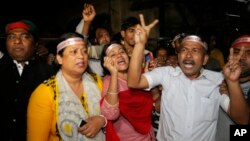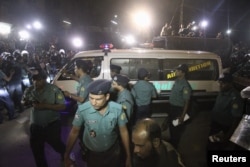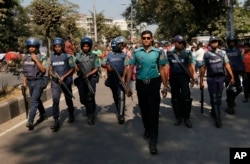Sunday's executions in Bangladesh of two opposition leaders, accused of committing crimes during the country's 1971 war of independence from Pakistan, have sparked mixed reactions in the country and outside.
Bangladesh's International Crime Tribunal found Ali Ahsan Mohammad Mujahid, a senior politician from the opposition Jamaat-e-Islami (JeI) party, guilty on charges of conspiracy in abduction, torture and killing of intellectuals during the war. ICT also convicted Salauddin Quader Chowdhury, a leader of the opposition Bangladesh Nationalist Party (BNP), on charges of torture, rape and genocide.
Following the executions, the ruling Awami League (AL) party and some groups supporting Bangladesh's war crime trials held victory rallies saying that Mujahid and Chowdhury deserved to be hanged for their war crimes.
But JeI and BNP said the executions were politically motivated and aimed at eliminating political rivals. Rights groups and legal experts charged that Bangladesh executed the men after a flawed trial.
Pakistan decries executions
Since Prime Minister Sheikh Hasina set up the ICT in 2010, it has convicted 24 people – mostly JeI leaders – of war crimes. Barring two, all those convicted were handed out death sentences by the tribunal. So far, four – including Mujahid and Chowdhury – have been executed.
Protests against Sunday's executions came from different corners, including Pakistan.
Pakistan's foreign ministry issued a statement saying the trials of the two men were flawed, and that "Pakistan is deeply disturbed" by the executions. In a sharp reaction, Bangladesh summoned Pakistan's high commissioner in Dhaka and handed over a protest note.
Bangladesh's junior foreign minister, Mohammed Shahriar Alam, said Pakistan had "no right" to make any comment on internal issues of Bangladesh.
"On the issue of these trials of war criminals, who committed crimes against humanity, we shall not tolerate any negative comment from any country," Alam said.
Victim's family welcomes punishment
Dr. Nuzhat Choudhury's father, an eye specialist, was killed by Al Badr militia that Mujahid was convicted of leading during the war. Choudhury said after the execution of Mujahid that she felt justice had been delivered.
"Mujahid was directly responsible for enlisting the names of top intellectuals of the time, like my father, and abducting them from their homes, brutally torturing them and subsequently murdering them. Therefore, in his trial and execution, my family and I personally got justice today," Choudhury told VOA.
On Friday, the U.S. State Department said the executions of Mujahid and Chowdhury should not take place until it was clear that the trial processes had met international standards.
Tureen Afroz, an ICT prosecutor, denied the tribunal's actions were motivated by politics.
"But if a trial is taking place in an independent judicial forum where a defendant can freely exercise his internationally recognized rights, we call it a fair trial. I would like to say that all trials of the ICT have been very defense friendly," Afroz told VOA.
Trials have 'serious flaws,' some say
Earlier this month, Amnesty International noted that the trial and appeal processes had suffered from "serious flaws."
"They were brought to the attention of the government by Amnesty International, Human Rights Watch and other independent observers,” said Abbas Faiz, senior south Asia researcher of AI. “The government authorities who had the power to stop the executions had full knowledge of these concerns. Yet, they went ahead with the executions."
Sam Zarifi, Asia-Pacific regional director of the International Commission of Jurists, said the human rights committee of the United Nations is very clear that if a government wants to carry out a death penalty, it has to ensure that the judicial process in the case has been absolutely fair.
"In the case of the International Crime Tribunal in Bangladesh, unfortunately this hasn't been the case,” Zarifi said to VOA. “We saw witnesses not being allowed to testify, evidence that could exculpate the defendants not being admitted on vague grounds."
Alex Carlile, a lawyer and member of Britain's House of Lords, said the trials in the cases of Mujahid and Chowdhury fell "far, far short of acceptable standards."
Pointing to the case that Bangladesh executed the two men just three or four hours after their reported presidential clemency petitions had been rejected, Carlile said Bangladesh resorted to unusual haste in carrying out the executions.
"I think the speed at which the executions took place is obscene,” he said. “It falls way outside any acceptable criminal justice policies. I think the Bangladesh government has lost all respect among lawyers the world over.”













